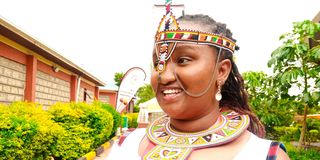Why climate financing in Africa should focus on women

Silvana Lesuuda from Suguta in Samburu County speaks to journalists during the eighth annual national indigenous women conference in Isiolo on September 27, 2023. Calls for women involvement in climate change adaptation and mitigation dominated the three-day conference.
What you need to know:
- Many smallholder farmers are women whose livelihoods and food sources are at risk from climate change.
- Women in Somalia told Oxfam they now have to walk more than four hours every day to fetch water, often on treacherous journeys.
The climate crisis has taken its toll especially on women and girls in the Horn of Africa. Many smallholder farmers are women whose livelihoods and food sources are at risk from climate change. Indeed, the plight of climate change in Africa is being felt by women.
Climate change in Africa touches on physical and socioeconomic security for girls and women. In particular, women in Somalia told Oxfam they now have to walk more than four hours every day to fetch water, often on treacherous journeys, a significantly increased distance compared to previous droughts.
Too often, when food is scarce, mothers eat last and least; and girls are the first to be dropped out of school or married off at a young age so that there is one less mouth to feed.
“Declining crop yields, changes in water availability, and more frequent heatwaves are increasing the unpaid workload of women and girls. This worsens economic and social marginalisation of women,” expressed Oxfam in Africa Director Fati N’Zi-Hassane, when she launched Oxfam’s Unfair Share Report on the sidelines of the inaugural Africa Climate Summit (ACS) in Nairobi last week.
“In Africa, women provide 60 per cent of the labour on agricultural farms, yet they own about 10 per cent of land,” stated Reena Ghelani, the UN Famine Prevention and Response coordinator.
Ms Ghelani was addressing a media roundtable organised by global humanitarian body Oxfam at the sidelines of the summit.
Though women in Africa bear the brunt of climate change injustices, they are the best bet in the push for a clean, healthy, and sustainable planet. Given their traditional roles in agricultural production, and as the procurers of water, cooking fuel, and other household resources, women are not only well suited to find solutions to prevent further degradation and adapt to the changing climate – they have a vested interest in doing so, Ms hassane pointed out.
The first step towards tackling the challenges of climate change is empowering women to safeguard the environment. “For our concerted efforts against climate change to be truly gender-sensitive and transformative, we need to get financing to women directly, ensure they get land ownership rights, and involve women in decision-making,” Ms Ghelani said.
If designed and implemented with a robust gender lens, the global response to climate change and environmental degradation can be truly transformative, rather than reinforce a vicious cycle.
It is estimated that three East African countries – Ethiopia, Kenya and Somalia –need $53.5 billion (Sh7.85 trillion) per year to finance their climate action programmes.
“However, they only received 5.0 per cent of this amount – $2.4 billion (Sh352 billion) in 2021. This highlights the fact that the rich nations, which have been leading us into this situation, have not supported countries and communities affected by climate change,” Ms Hassane said.
In addition, nearly half the funds, 45 per cent, they did give were loans, plunging the region further into more debt, she noted. This saw the UN Secretary General call for debt restructuring, and additional financing in climate adaptation and mitigation so that governments in Africa can invest in the opportunities that exist locally.
Leading up to COP28, African women must be loud in demanding that a fair share of climate financing focuses on not only reducing their plight but also helping them to develop and implement localised solutions.
“We need to work with communities to develop grassroots solutions that require unusual business models. We are asking all the different actors to ensure adequate climate financing so that we can maximise the solutions that Africa can work with,” said Mahboub Maalim, special adviser on the hunger crisis at the International Federation of the Red Cross and Red Crescent.
In October 2022, Reem Alsalem, UN special rapporteur on violence against women and girls, informed the General Assembly that climate change and environmental degradation were escalating the risk and prevalence of violence against women and girls across the globe.
“The cumulative and gendered consequences of climate change and environmental degradation breach all aspects of the rights of women and girls,” the expert had noted.
“Climate change is not only an ecological crisis, but fundamentally a question of justice, prosperity and gender equality, and intrinsically linked to and influenced by structural inequality and discrimination.”
Climate change is the most consequential threat multiplier for women and girls, with far-reaching impacts on new and existing forms of gendered inequities.





